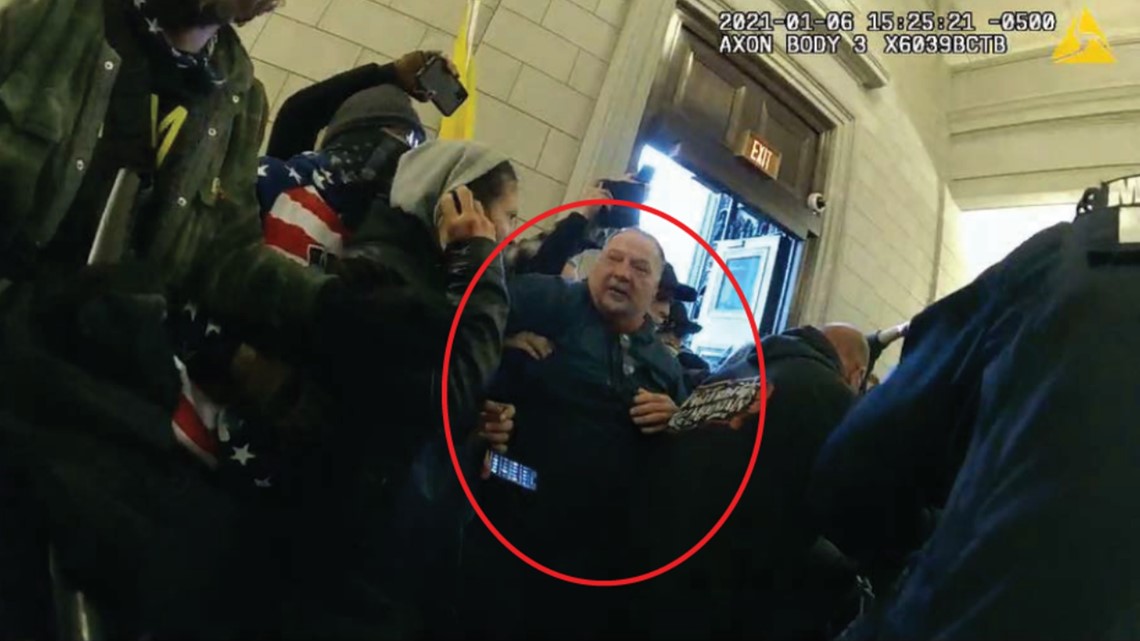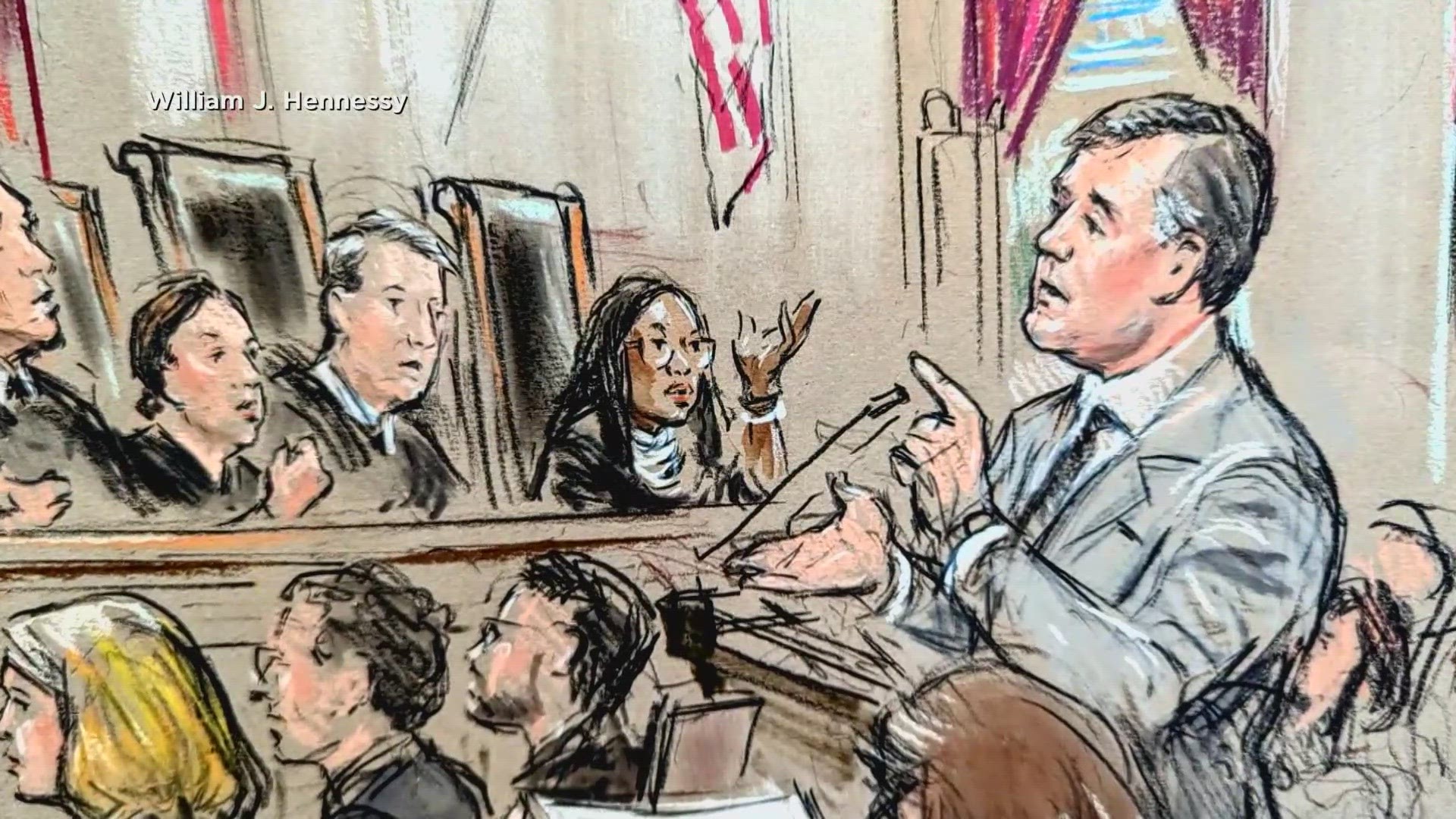WASHINGTON — On Tuesday, the U.S. Supreme Court will hear arguments to determine whether the Justice Department overreached when it used a post-Enron law to charge hundreds of Jan. 6 defendants with a felony for obstructing the certification of the 2020 election.
The case, titled Joseph W. Fischer v. United States, centers on the obstruction of an official proceeding charge used in more than 330 Capitol riot cases. Those include some of the government’s largest and most complex prosecutions related to the riot, including the seditious conspiracy cases against members of the Proud Boys and Oath Keepers, as well as dozens of cases involving violent assaults on police.
Arguments are set to begin at 10 a.m. Eastern. Below, find more information about how to listen and what the case is about.
How to Listen to Supreme Court Arguments
Live audio of SCOTUS oral arguments is available online through the court’s website.
If you miss the live arguments, or want to listen to it again, recordings of oral arguments before the court going back to 2010 are available here.
What is the Case About?
The appeal was filed by Joseph Fischer, a former Pennsylvania police officer accused of charging a line of police inside the U.S. Capitol. In a Facebook post after the riot, investigators say Fischer wrote, “I was there… we pushed police back about 25 feet. Got pepper balled and OC sprayed, but entry into the Capital [sic] was needed to send a message that we the people hold the real power.”
Fischer was charged with multiple felony counts, including assaulting police and obstruction of an official proceeding. Fischer asked U.S. District Judge Carl Nichols to dismiss many of the counts against him. One of those counts was 18 U.S.C. § 1512(c)(2) — obstruction of an official proceeding – created by Congress in order to fill loopholes in the obstruction statute following the Enron scandal.
In March 2022, Nichols denied most of his motion – but agreed to dismiss the obstruction count.
Nichols, a former deputy assistant attorney general who was nominated to the federal bench by former President Donald Trump in 2019, ruled that the statute required defendants to “have taken some action with respect to a document, record, or other object in order to corruptly obstruct, impede or influence an official proceeding.” Nichols ultimately dismissed the obstruction charge against three defendants, becoming the first, and only, judge on the D.C. District Court to do so.


The Justice Department appealed Nichols’ decision in all three cases to the D.C. Circuit Court of Appeals, arguing the statute should be read as a catch-all provision for any obstructive conduct not covered by a previous section of the law dealing with destroying records or documents. Last April, a three-judge panel agreed.
“Under the most natural reading of the statute, § 1512(c)(2) applies to all forms of corrupt obstruction of an official proceeding, other than the conduct that is already covered by § 1512(c)(1),” D.C. Circuit Court Judge Florence Pan, a nominee of President Joe Biden, wrote.
Pan’s opinion was joined in part by D.C. District Court Judge Justin R. Walker, who was first nominated to the federal bench by former President Donald Trump in June 2019 and then elevated as one of his final appellate court nominations in May 2020. D.C. Circuit Court Judge Gregory G. Katsas, who served as deputy White House counsel during the Trump administration before being nominated to the D.C. Circuit Court in September 2017, dissented.
Although Pan and Walker agreed the charge did not require a nexus to a document or record, the judges split on another part of the statute requiring defendants to obstruct the proceeding “corruptly.”
Under the definition Walker endorsed, the Justice Department would have to show Jan. 6 defendants both knew they were acting to obtain an “unlawful benefit” but also it must have been their “objective or purpose.”
Pan, in the lead opinion, urged the Circuit to wait until the issue was actually raised by a defendant in an appeal – noting a premature ruling on the definition of “corruptly” could have far-ranging effects on cases outside of Jan. 6 prosecutions.
“For example, the concurring opinion dos not appear to consider that there are around 50 other references to ‘corruptly’ in Title 18 of the U.S. Code,” Pan wrote. “Adopting the concurrence’s definition of ‘corruptly’ could make it more difficult for the government to prosecute all the crimes defined in those other statutes – including obstruction of justice under 18 U.S.C. § 1503, a statute for which the Supreme Court has declined to approve the very definition of ‘corruptly’ espoused by the concurrence.”
Ultimately, the Circuit did not issue a ruling about what definition of “corruptly” lower court judges should use in Jan. 6 cases.
What Arguments Will the Court Hear?
Fischer is being represented by the Federal Public Defender’s Office. His attorneys will argue § 1512(c)(2) is a “residual clause” of § 1512(c)(1) — meaning it is limited to individuals accused of altering, destroying, mutilating or concealing evidence that obstructs congressional inquiries and investigations. Fischer’s attorneys say the Justice Department has taken this clause and stretched it into a “novel omnibus obstruction offense with breathtaking reach.” You can read the brief filed by Fischer’s attorneys here.
Federal prosecutors will argue the Circuit panel got it right – that § 1512(c)(2) covers acts that obstruct official Congressional proceedings, like the joint session of Congress, outside the scope of destroying or altering records or documents. The government’s brief can be read here.
What Effect Could SCOTUS’ Decision Have?
More than 330 defendants have been charged with obstruction of an official proceeding related to the Capitol riot, including more than 150 who have already been sentenced. Those sentences include former Proud Boys national chairman Enrique Tarrio, who received 22 years in prison, and Oath Keepers founder Stewart Rhodes, who received 18 years.
If the Supreme Court were to agree with Nichols’ reading – or to otherwise decide the charge was not applicable in Jan. 6 cases – all of those defendants would likely seek to have the charges dismissed from their indictments, their sentences vacated or, in many cases, a new trial.
If the justices agree with the government, it would immediately get the gears moving again on the dozens of Jan. 6 cases, including many waiting for trial, that have been in a holding position since the court agreed to hear the case last year. Those cases include the prosecution of Maj. Christopher Warnagiris, a former Marine Corps officer who went to trial before a judge earlier this month but will have to wait until the Supreme Court rules in Fischer to learn the verdict. Fischer himself has also yet to go to trial as his and the DOJ’s appeals have worked their way through the court system.
The Supreme Court’s decision could also affect the election fraud case against Trump, who faces the same obstruction charge along with three other counts of conspiracy. Special Counsel Jack Smith has said he believes even if SCOTUS were to agree that § 1512(c)(2) requires an attempt to alter or destroy records or documents, his prosecution against Trump would hold up because of the false slates of electors the former president and his allies worked to assemble.

